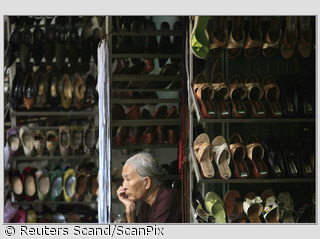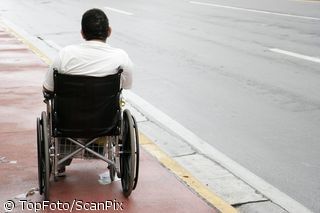European Union supporters in Latvia and Estonia expressed concern Thursday about a new survey pegging their countries as the most EU-skeptical in Europe
Published:
4 August 2003 y., Monday
European Union supporters in Latvia and Estonia expressed concern Thursday about a new survey pegging their countries as the most EU-skeptical in Europe—findings that come just two months before both Baltic states hold referendums on membership. A mere 32 percent of Estonians and 37 percent of Latvians agreed entry would be "a good thing," making them the most pessimistic of those questioned in the EU study released Wednesday. By contrast, 72 percent of Cypriots and 61 percent of Poles said joining would be good for them.
Latvia and Estonia will be the last of 10 EU candidate countries to put the issue of entry to a vote—and observers say there's now a chance that one or both nations could become the first to reject membership in Europe's most powerful multilateral club.
"People are afraid, they don't know what to believe and they're confused," said Pille-Mai Helemae, spokeswoman for the high-profile "Yes to the EU" group in Estonia. "It's going to be a hard fight. But in the end, I'm sure enough people will see more pros than cons to membership." Confusion about the EU was illustrated in the biannual Eurobarometer _ which questioned 1,000 people in each candidate nation in May—with 62 percent of Latvian and 71 percent of Estonian respondents saying they were either poorly informed about the accession process or not informed at all.
The Czech Republic, Hungary, Lithuania, Poland, Slovakia, Slovenia and Malta have already approved EU referendums, most by wide margins. Cyprus is leaving it's decision to lawmakers. If Estonia and Latvia pass their plebiscites on Sept. 14 and Sept. 20 respectively, they would join the EU together with the other candidates in 2004.
Virtually all top leaders in Estonia and Latvia have been pro-EU since the Baltic Sea nations regained independence—arguing that entry will raise their nations international stature, forge vital European trade links and boost living standards.
But official enthusiasm has never been matched outside the halls of power, with many Estonians and Latvians fearing a loss of sovereignty to the EU. Anti-EU groups compare what they say is an overly centralized EU with the U.S.S.R.; one of their symbols is an EU flag stamped with a Communist hammer and sickle.
If the results of the latest survey spooked EU supporters, they delighted opponents. "If you're a EU supporter, I believe the picture is even blacker," said Uno Silberg, who heads Estonia's "No to the EU Movement." "We're confident the referendum will fail."
Šaltinis:
balticsww.com
Copying, publishing, announcing any information from the News.lt portal without written permission of News.lt editorial office is prohibited.
The most popular articles
 Ensuring that women are protected from physical, sexual or psychological abuse if they flee abroad is what lies behind the proposed European Protection Order.
more »
Ensuring that women are protected from physical, sexual or psychological abuse if they flee abroad is what lies behind the proposed European Protection Order.
more »
 Remnants of Tropical Storm Agatha dumped more rain across Central America, killing at least 73 people in the region, and forcing scores of others to flee their homes.
more »
Remnants of Tropical Storm Agatha dumped more rain across Central America, killing at least 73 people in the region, and forcing scores of others to flee their homes.
more »
 Ninety-three-year old Lim Guan Siew looks back, with regret, on her experience of the long-dispelled Chinese custom of foot-binding.
more »
Ninety-three-year old Lim Guan Siew looks back, with regret, on her experience of the long-dispelled Chinese custom of foot-binding.
more »
 Ahead of the 2010 No Tobacco Day (Monday 31st May), the European Commission unveils the results of a Eurobarometer survey which shows that a strong majority of EU citizens support stronger tobacco control measures.
more »
Ahead of the 2010 No Tobacco Day (Monday 31st May), the European Commission unveils the results of a Eurobarometer survey which shows that a strong majority of EU citizens support stronger tobacco control measures.
more »
 Enviromentalist and endurance swimmer Lewis Pugh puts his body to the test in thin air and cold water to highlight shrinking glaciers in high mountain ranges.
more »
Enviromentalist and endurance swimmer Lewis Pugh puts his body to the test in thin air and cold water to highlight shrinking glaciers in high mountain ranges.
more »
 It’s a dog’s life for the 1,500 unwanted strays who spend their days in a slum-like shelters in Brazil’s southern city of Caxias do Sul.
more »
It’s a dog’s life for the 1,500 unwanted strays who spend their days in a slum-like shelters in Brazil’s southern city of Caxias do Sul.
more »
 Three resolutions on the situation in Thailand, the pre-election climate in Burma and religious freedom in Pakistan were adopted by the European Parliament in Strasbourg on Thursday.
more »
Three resolutions on the situation in Thailand, the pre-election climate in Burma and religious freedom in Pakistan were adopted by the European Parliament in Strasbourg on Thursday.
more »
 Growing numbers of children enroll in kung-fu schools to learn self-defense techniques after a series of school attacks in recent weeks spark wide-spread concern in China.
more »
Growing numbers of children enroll in kung-fu schools to learn self-defense techniques after a series of school attacks in recent weeks spark wide-spread concern in China.
more »
 Homosexuality in the military can be a thorny issue around the world, with gay and lesbian soldiers often hiding their sexual preference out of fear.
more »
Homosexuality in the military can be a thorny issue around the world, with gay and lesbian soldiers often hiding their sexual preference out of fear.
more »
 European Commission Vice-President Viviane Reding will urge EU Member States to swiftly ratify the UN Convention on the Rights of Persons with Disabilities during a May 19 Ministers’ meeting in Zaragoza, Spain.
more »
European Commission Vice-President Viviane Reding will urge EU Member States to swiftly ratify the UN Convention on the Rights of Persons with Disabilities during a May 19 Ministers’ meeting in Zaragoza, Spain.
more »